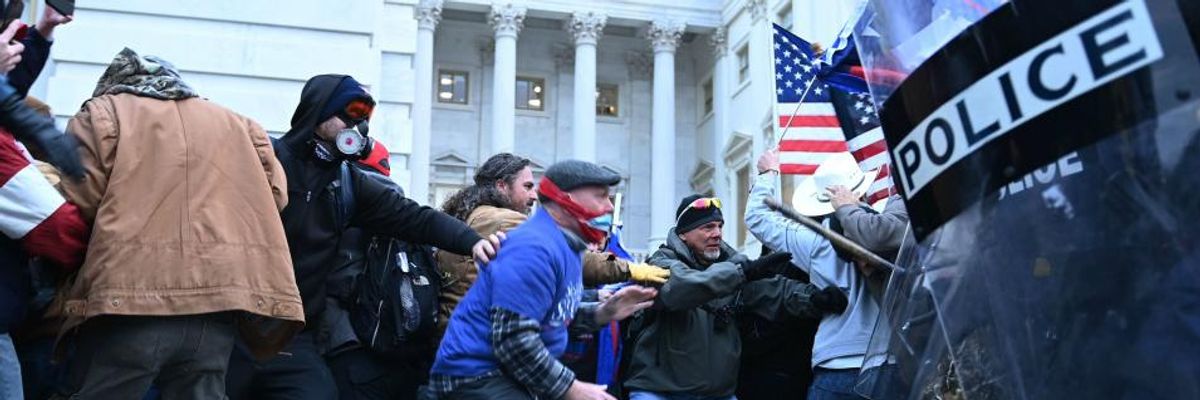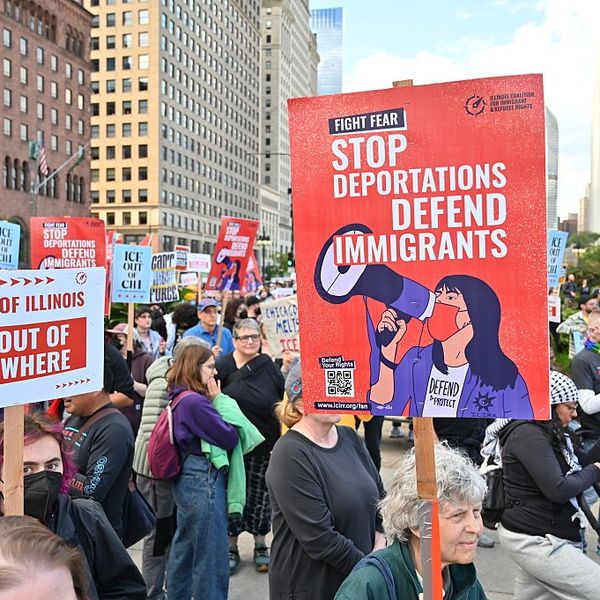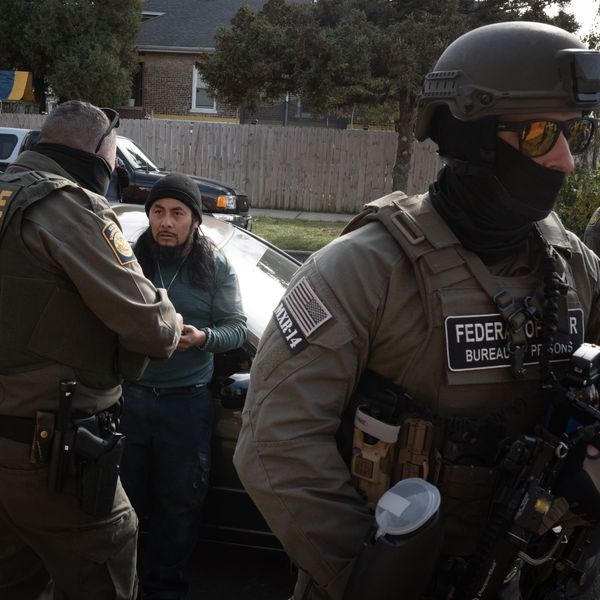
Trump supporters clash with police and security forces, as they storm the US Capitol in Washington, DC, on January 6, 2021. - Demonstrators breeched security and entered the Capitol as Congress debated the a 2020 presidential election Electoral Vote Certification. (Photo: Brendan Smialowski/AFP via Getty Images)
Civil Society Groups Warn Against Anti-Protest Legislation Following Siege of US Capital
"We have to make sure this moment is not used to further anti-protest legislation."
Hours after Confederate flag-toting white supremacists made their way into the U.S. Capitol to disrupt the certification of the U.S. presidential election, the Florida House of Representatives released a statement announcing its intention to pass a bill to clamp down on protests.
"In response to the violent mobs in Washington, D.C., the Florida House of Representatives and Senate filed identical bills to combat violence, disorder and looting in Florida," the release reads.
"While we condemn these crimes against democracy, such antics cannot be used to justify new repressive measures against actual protests, restrictions of the right of peaceful assembly, or curtailment of speech."
--Chip Gibbons, Defending Rights and Dissent
The proposed legislation in Florida is a continuation of a national trend to attempt to criminalize Black Lives Matter, indigenous and other civil rights protest movements. The proposed Florida legislation aims to punish municipalities that reduce funding to police departments, protect Confederate monuments, legalize forms of vigilante violence against protesters, and heighten "riot" charges. Democratic State Rep. Omari Hardy called it "bad legislation that is fundamentally un-American," and "unconstitutional."
Across the nation, dozens of sister anti-protest bills have been passed and proposed over the past few years, many at the behest of law enforcement lobbies and unions and influential corporate lobbies.
The proposed Florida bills are not alone.
A bill to criminalize anti-pipeline demonstrations is awaiting Ohio Governor Mike DeWine's signature (SB33). Others, to legalize violence against protesters, further criminalize, or punish protesting, are alive in Missouri (SB 26, SB 66, HB56), New Jersey (S 3261, A 4991, AB 3760), Oklahoma (SB 15), South Carolina (HB 3491), Virginia (SB 5079, SB 5058, SB 5074), according to the International Center for Not-For-Profit Law, as well as in Nebraska, Texas and Utah.
Weaponizing the siege of the U.S. Capitol
When news broke of the white supremacists breaching the U.S. Capitol, multiple news outlets repeated statements labeling the mob as "anarchists," echoing White House efforts to target "Antifa."
This type of weaponization of the day's events to justify efforts to clamp down on protests is raising concerns among civil society groups.
"We have to make sure this moment is not used to further anti-protest legislation," says Justin Hansford, Founder and Director of Harvard University's Thurgood Marshall Civil Rights Center.
The events on December 6 showcased preferential treatment by law enforcement for white supremacist groups. "The tanks, batons, and tear gas rounds aggressively used against BLM protesters this summer were conspicuously absent when these white supremacists stormed the capitol building," says Hansford. "At the end of the day, for many people around the world, this incident punctuated not only the delusion of President Trump's supporters but more enduringly, the fundamentally racially tinged nature of police response to public assemblies."
This preferential treatment, also condemed by the National Lawyers Guild, is further proof that any new efforts to strengthen the power law enforcement to clamp down on dissent--such as through domestic terrorism legislation--is "without basis," says Mara Verheyden-Hilliard, Executive Director, Partnership for Civil Justice Fund.
"This violent mob was allowed to storm the Capitol," says Verheyden-Hilliard. "The differential treatment that they received, and as compared to the brutal attacks on actual First Amendment protected activity of the racial justice movement, is stunning. Capitol police have all the weapons, tactics and personnel at their disposal but they made an obvious decision not to deploy them. The last thing we need is to allow this right-wing attack on the Capitol to become a vehicle to give police more tools to clamp down on the progressive, peaceful social justice movement." (The DC Police purchased over $130,000 worth of tear gas just before the November 2020 election and turned down offers from the Pentagon for backup.)
Chip Gibbons, Policy Director for Defending Rights and Dissent agrees. "While we condemn these crimes against democracy, such antics cannot be used to justify new repressive measures against actual protests, restrictions of the right of peaceful assembly, or curtailment of speech," said Gibbons in a statement.
Groups including Partnership for Civil Justice Fund, Center for Protest Law and Litigation, Defending Rights & Dissent and Justice for Muslims Collective are demanding probes into the federal and local police planning and response to Wednesday's events.
An Urgent Message From Our Co-Founder
Dear Common Dreams reader, The U.S. is on a fast track to authoritarianism like nothing I've ever seen. Meanwhile, corporate news outlets are utterly capitulating to Trump, twisting their coverage to avoid drawing his ire while lining up to stuff cash in his pockets. That's why I believe that Common Dreams is doing the best and most consequential reporting that we've ever done. Our small but mighty team is a progressive reporting powerhouse, covering the news every day that the corporate media never will. Our mission has always been simple: To inform. To inspire. And to ignite change for the common good. Now here's the key piece that I want all our readers to understand: None of this would be possible without your financial support. That's not just some fundraising cliche. It's the absolute and literal truth. We don't accept corporate advertising and never will. We don't have a paywall because we don't think people should be blocked from critical news based on their ability to pay. Everything we do is funded by the donations of readers like you. Will you donate now to help power the nonprofit, independent reporting of Common Dreams? Thank you for being a vital member of our community. Together, we can keep independent journalism alive when it’s needed most. - Craig Brown, Co-founder |
Hours after Confederate flag-toting white supremacists made their way into the U.S. Capitol to disrupt the certification of the U.S. presidential election, the Florida House of Representatives released a statement announcing its intention to pass a bill to clamp down on protests.
"In response to the violent mobs in Washington, D.C., the Florida House of Representatives and Senate filed identical bills to combat violence, disorder and looting in Florida," the release reads.
"While we condemn these crimes against democracy, such antics cannot be used to justify new repressive measures against actual protests, restrictions of the right of peaceful assembly, or curtailment of speech."
--Chip Gibbons, Defending Rights and Dissent
The proposed legislation in Florida is a continuation of a national trend to attempt to criminalize Black Lives Matter, indigenous and other civil rights protest movements. The proposed Florida legislation aims to punish municipalities that reduce funding to police departments, protect Confederate monuments, legalize forms of vigilante violence against protesters, and heighten "riot" charges. Democratic State Rep. Omari Hardy called it "bad legislation that is fundamentally un-American," and "unconstitutional."
Across the nation, dozens of sister anti-protest bills have been passed and proposed over the past few years, many at the behest of law enforcement lobbies and unions and influential corporate lobbies.
The proposed Florida bills are not alone.
A bill to criminalize anti-pipeline demonstrations is awaiting Ohio Governor Mike DeWine's signature (SB33). Others, to legalize violence against protesters, further criminalize, or punish protesting, are alive in Missouri (SB 26, SB 66, HB56), New Jersey (S 3261, A 4991, AB 3760), Oklahoma (SB 15), South Carolina (HB 3491), Virginia (SB 5079, SB 5058, SB 5074), according to the International Center for Not-For-Profit Law, as well as in Nebraska, Texas and Utah.
Weaponizing the siege of the U.S. Capitol
When news broke of the white supremacists breaching the U.S. Capitol, multiple news outlets repeated statements labeling the mob as "anarchists," echoing White House efforts to target "Antifa."
This type of weaponization of the day's events to justify efforts to clamp down on protests is raising concerns among civil society groups.
"We have to make sure this moment is not used to further anti-protest legislation," says Justin Hansford, Founder and Director of Harvard University's Thurgood Marshall Civil Rights Center.
The events on December 6 showcased preferential treatment by law enforcement for white supremacist groups. "The tanks, batons, and tear gas rounds aggressively used against BLM protesters this summer were conspicuously absent when these white supremacists stormed the capitol building," says Hansford. "At the end of the day, for many people around the world, this incident punctuated not only the delusion of President Trump's supporters but more enduringly, the fundamentally racially tinged nature of police response to public assemblies."
This preferential treatment, also condemed by the National Lawyers Guild, is further proof that any new efforts to strengthen the power law enforcement to clamp down on dissent--such as through domestic terrorism legislation--is "without basis," says Mara Verheyden-Hilliard, Executive Director, Partnership for Civil Justice Fund.
"This violent mob was allowed to storm the Capitol," says Verheyden-Hilliard. "The differential treatment that they received, and as compared to the brutal attacks on actual First Amendment protected activity of the racial justice movement, is stunning. Capitol police have all the weapons, tactics and personnel at their disposal but they made an obvious decision not to deploy them. The last thing we need is to allow this right-wing attack on the Capitol to become a vehicle to give police more tools to clamp down on the progressive, peaceful social justice movement." (The DC Police purchased over $130,000 worth of tear gas just before the November 2020 election and turned down offers from the Pentagon for backup.)
Chip Gibbons, Policy Director for Defending Rights and Dissent agrees. "While we condemn these crimes against democracy, such antics cannot be used to justify new repressive measures against actual protests, restrictions of the right of peaceful assembly, or curtailment of speech," said Gibbons in a statement.
Groups including Partnership for Civil Justice Fund, Center for Protest Law and Litigation, Defending Rights & Dissent and Justice for Muslims Collective are demanding probes into the federal and local police planning and response to Wednesday's events.
Hours after Confederate flag-toting white supremacists made their way into the U.S. Capitol to disrupt the certification of the U.S. presidential election, the Florida House of Representatives released a statement announcing its intention to pass a bill to clamp down on protests.
"In response to the violent mobs in Washington, D.C., the Florida House of Representatives and Senate filed identical bills to combat violence, disorder and looting in Florida," the release reads.
"While we condemn these crimes against democracy, such antics cannot be used to justify new repressive measures against actual protests, restrictions of the right of peaceful assembly, or curtailment of speech."
--Chip Gibbons, Defending Rights and Dissent
The proposed legislation in Florida is a continuation of a national trend to attempt to criminalize Black Lives Matter, indigenous and other civil rights protest movements. The proposed Florida legislation aims to punish municipalities that reduce funding to police departments, protect Confederate monuments, legalize forms of vigilante violence against protesters, and heighten "riot" charges. Democratic State Rep. Omari Hardy called it "bad legislation that is fundamentally un-American," and "unconstitutional."
Across the nation, dozens of sister anti-protest bills have been passed and proposed over the past few years, many at the behest of law enforcement lobbies and unions and influential corporate lobbies.
The proposed Florida bills are not alone.
A bill to criminalize anti-pipeline demonstrations is awaiting Ohio Governor Mike DeWine's signature (SB33). Others, to legalize violence against protesters, further criminalize, or punish protesting, are alive in Missouri (SB 26, SB 66, HB56), New Jersey (S 3261, A 4991, AB 3760), Oklahoma (SB 15), South Carolina (HB 3491), Virginia (SB 5079, SB 5058, SB 5074), according to the International Center for Not-For-Profit Law, as well as in Nebraska, Texas and Utah.
Weaponizing the siege of the U.S. Capitol
When news broke of the white supremacists breaching the U.S. Capitol, multiple news outlets repeated statements labeling the mob as "anarchists," echoing White House efforts to target "Antifa."
This type of weaponization of the day's events to justify efforts to clamp down on protests is raising concerns among civil society groups.
"We have to make sure this moment is not used to further anti-protest legislation," says Justin Hansford, Founder and Director of Harvard University's Thurgood Marshall Civil Rights Center.
The events on December 6 showcased preferential treatment by law enforcement for white supremacist groups. "The tanks, batons, and tear gas rounds aggressively used against BLM protesters this summer were conspicuously absent when these white supremacists stormed the capitol building," says Hansford. "At the end of the day, for many people around the world, this incident punctuated not only the delusion of President Trump's supporters but more enduringly, the fundamentally racially tinged nature of police response to public assemblies."
This preferential treatment, also condemed by the National Lawyers Guild, is further proof that any new efforts to strengthen the power law enforcement to clamp down on dissent--such as through domestic terrorism legislation--is "without basis," says Mara Verheyden-Hilliard, Executive Director, Partnership for Civil Justice Fund.
"This violent mob was allowed to storm the Capitol," says Verheyden-Hilliard. "The differential treatment that they received, and as compared to the brutal attacks on actual First Amendment protected activity of the racial justice movement, is stunning. Capitol police have all the weapons, tactics and personnel at their disposal but they made an obvious decision not to deploy them. The last thing we need is to allow this right-wing attack on the Capitol to become a vehicle to give police more tools to clamp down on the progressive, peaceful social justice movement." (The DC Police purchased over $130,000 worth of tear gas just before the November 2020 election and turned down offers from the Pentagon for backup.)
Chip Gibbons, Policy Director for Defending Rights and Dissent agrees. "While we condemn these crimes against democracy, such antics cannot be used to justify new repressive measures against actual protests, restrictions of the right of peaceful assembly, or curtailment of speech," said Gibbons in a statement.
Groups including Partnership for Civil Justice Fund, Center for Protest Law and Litigation, Defending Rights & Dissent and Justice for Muslims Collective are demanding probes into the federal and local police planning and response to Wednesday's events.

